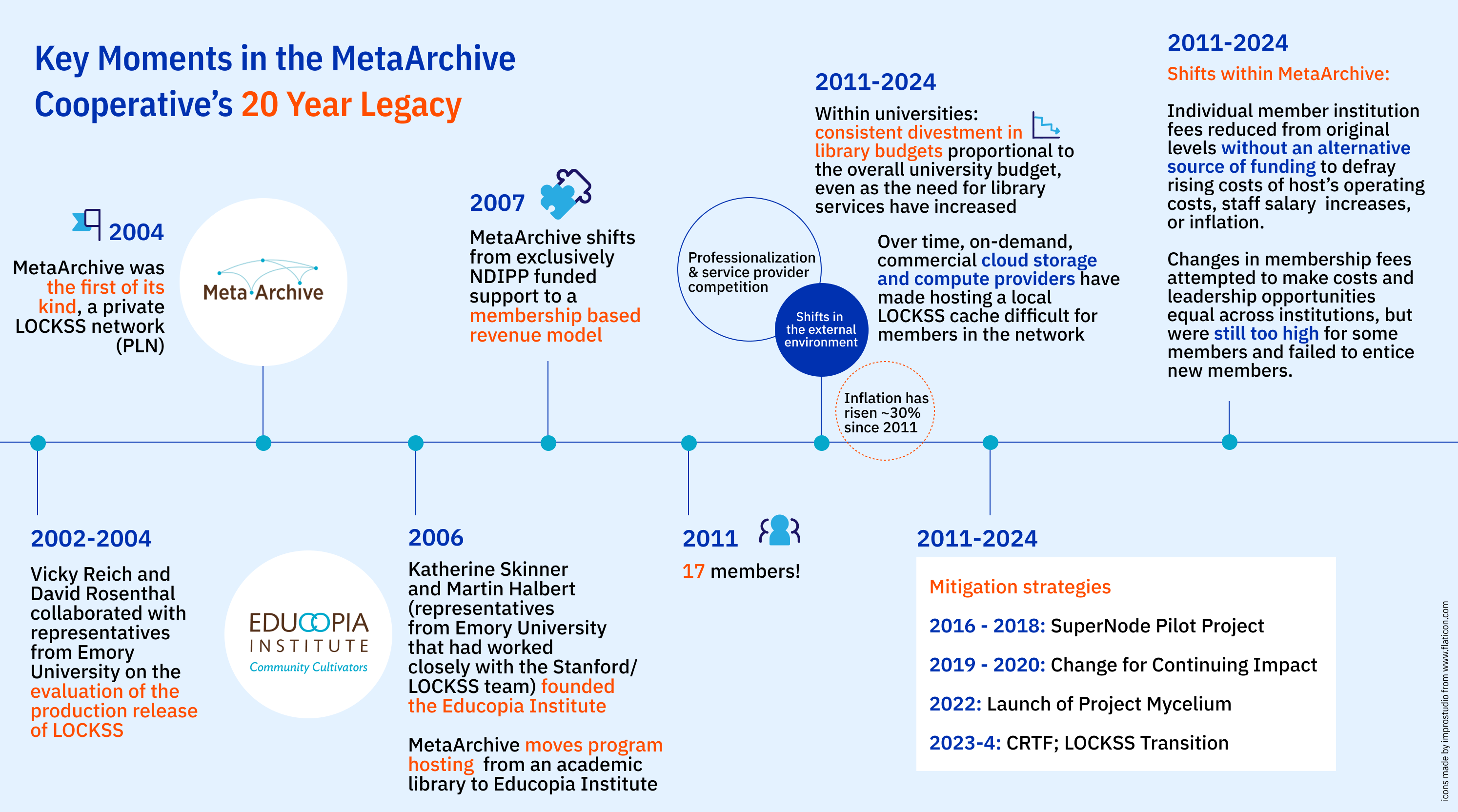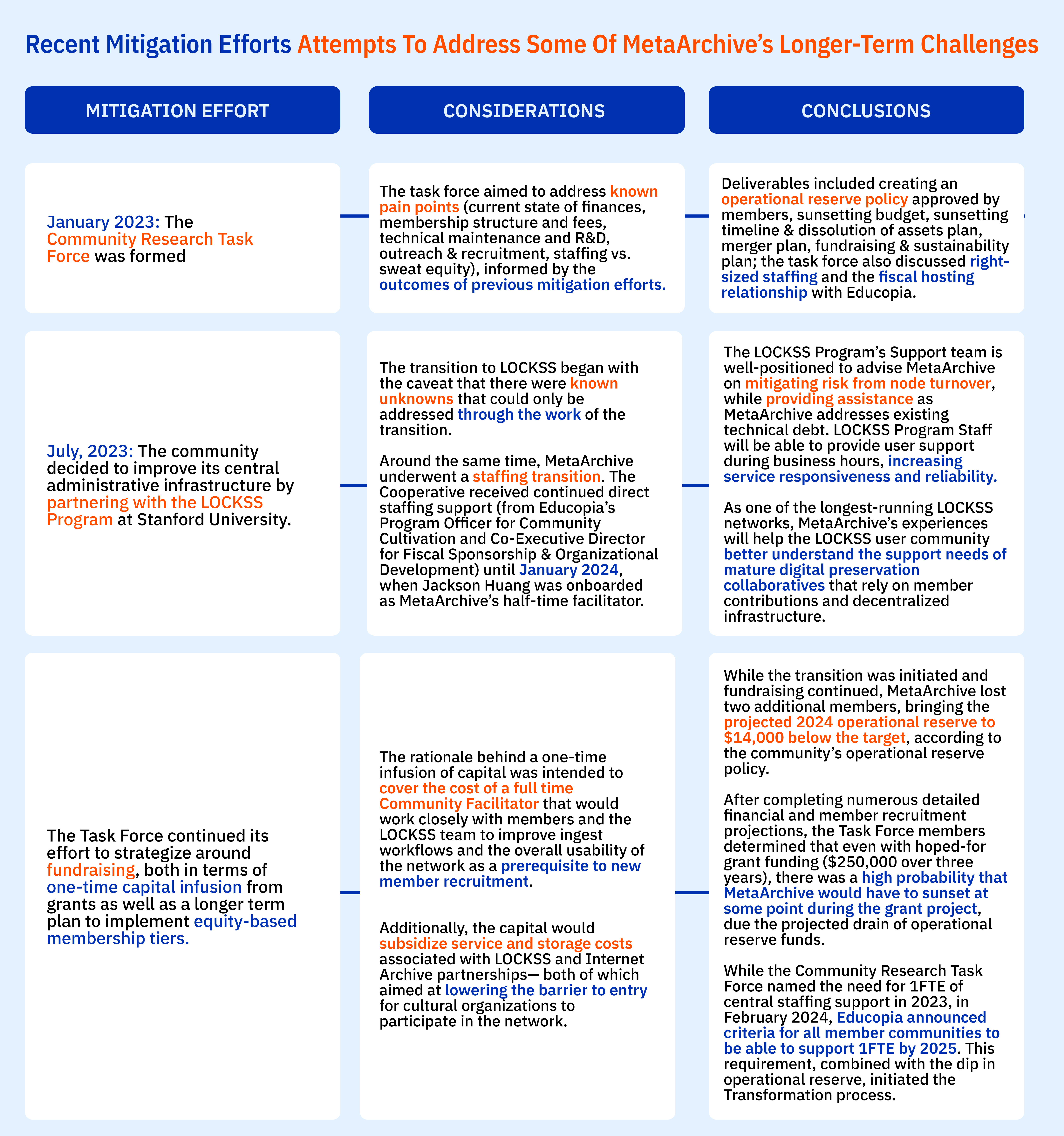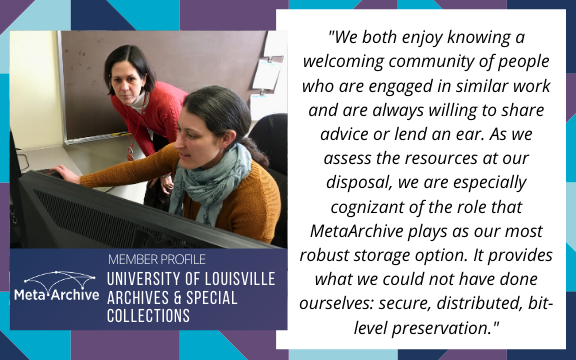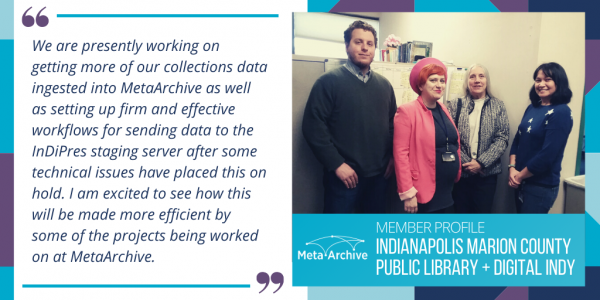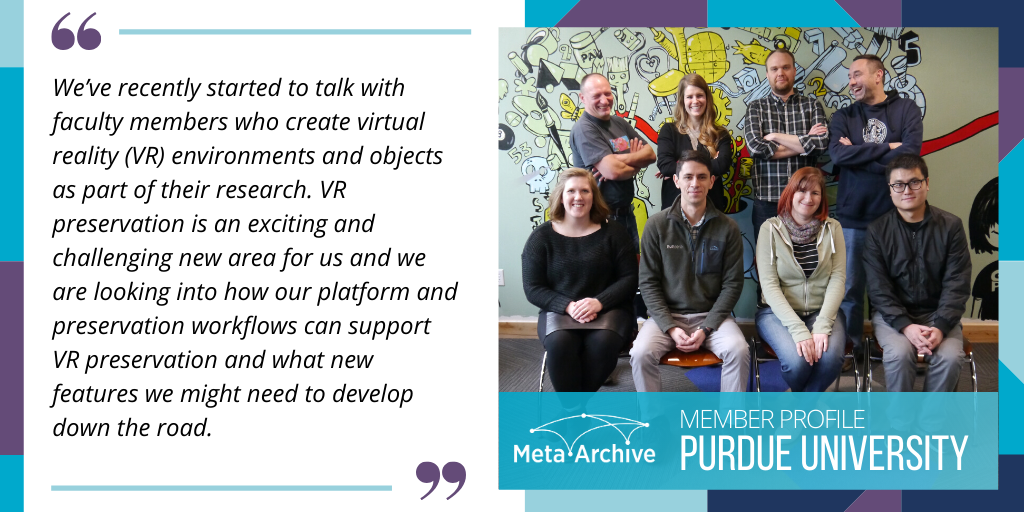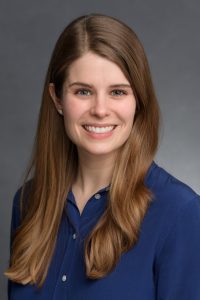May 30, 2024
MetaArchive Cooperative Transformation: Frequently Asked Questions
General Questions
Context
1. What’s going on with MetaArchive?
MetaArchive Cooperative is undergoing an administrative and technical transformation, because by the end of 2025, MetaArchive will no longer be hosted by Educopia Institute. The Cooperative remains intact as a group, and the data held within its networks remains secure.
In March 2024, we completed the transfer of the technical infrastructure to the LOCKSS Program. LOCKSS will continue to provide technical support to the network and will be instrumental in the transformation process. The Cooperative is convening a Transformation Research Team to bring together the expertise, perspectives, and efforts of key stakeholder groups to determine clear, feasible pathways for MA members. These pathways might include merging with another LOCKSS network, forming one or more new PLNs with different administrative hosts, or migrating members’ content to a geographically/topically/financially relevant PLN of their choice.
2. Why is Educopia no longer hosting the MetaArchive Cooperative?
In March 2024, Educopia completed the first year of a 3-year operational funding investment from the Mellon Foundation.You can read more about Educopia’s Mellon-funded capacity building work here. Educopia is now in the process of making data-informed changes to its business model, changes that will both contribute to greater financial sustainability and respond to the lived experience of staff members that have worked part time on one or more member communities at the same time.
Beginning January 2025, all member communities hosted by Educopia will have to support 1 Full-time Employee (rather than .5FTE). The impact of this new criteria is very different for each community, as they all have different trajectories– different foundings, activities, and staffing levels over time. For MetaArchive, this new criteria intersects with changes in the information landscape over the 20 years of the Cooperative’s existence, a dip in its Operational Reserve, and on-going questions regarding sustainability.
For the benefit of all parties involved, MetaArchive will no longer be hosted by Educopia Institute in 2025. Educopia will work closely with MetaArchive and LOCKSS Program staff in 2024 to map out its next phase, i.e., feasible future pathways, by:
- Mapping clear pathways for members: Merging with another PLN; Forming one or more new PLNs with a different administrative host; Migrating member content to an existing private LOCKSS network
- Gathering all of MetaArchive’s historical documentation since its inception
- Ensuring ongoing facilitation and coordination network needs are being met in collaboration with membership and LOCKSS Program staff, until Jackson Huang returns in July
- Consultation and project management while participating directly in the Transformation research (until the end of Q3 2024)
- Communications planning and support to Leadership and the Membership & Outreach Committee: Community-wide informational resources as well as public communications
3. What will Educopia focus on next?
Educopia continues to mature, grow, and change guided by its new Vision and Mission Statements. With explicit descriptions of fiscal hosting criteria, services, and fees coming soon to our website, Educopia will continue to provide fiscal sponsorship to groups and projects focusing on knowledge production, knowledge preservation, and knowledge sharing. We hope to expand our fiscal sponsorship portfolio, centering projects and initiatives that reduce knowledge inequities. Educopia will also continue to grow its consulting portfolio and pursue collaborative research projects that inform field-level understanding in organizational development and cultivation of diverse knowledge communities; collaborative knowledge production and publishing; digital preservation and curation; and community-controlled infrastructure.
4. What happened to the IMLS Implementation grant proposal?
The rationale behind the IMLS Implementation grant proposal was a one-time infusion of capital to cover the cost of a full time Community Facilitator that would work closely with members and the LOCKSS team to improve ingest workflows and the overall usability of the network as a prerequisite to new member recruitment. Additionally, the capital would subsidize service and storage costs associated with LOCKSS Program and Internet Archive partnerships—both of which aimed at lowering the barrier to entry for cultural organizations to participate in the network.
While the transition was initiated and grant writing continued, MetaArchive lost two additional members, bringing the projected 2024 operational reserve to $14,000 below the target, according to the community’s operational reserve policy.
After completing numerous detailed financial and member recruitment projections, the Task Force members determined that even with hoped-for grant funding ($250,000 over three years), there was a high probability that MetaArchive would have to sunset at some point during the grant project, due the projected drain of operational reserve funds.
While the Community Research Task Force named the need for 1FTE of central staffing support in 2023, in February 2024, Educopia announced criteria for all member communities to be able to support 1FTE by 2025. This requirement, combined with the dip in operational reserve, initiated the Transformation process.
5. Will MetaArchive still be an Educopia Community?
Once members have been provided with all possible pathways (no later than the end of Q3 2024) so they can make an informed decision, implementation of said member decisions will begin by or before January 2025. Once all members have transitioned their data to their chosen digital preservation pathway, MetaArchive will no longer be affiliated with Educopia.
The Community Research Task Force
1. What happened to the Community Research Task Force (CRTF)?
At the end of its second decade of operations, the Cooperative formed a Community Research Task Force with the intention of going beyond business-as-usual to “do things differently to get the long term success we are all working towards”. Convening weekly for over a year, the Task Force researched, documented, presented information, and made recommendations to broader membership, enabling them to make evidence-based decisions regarding MetaArchive’s strategic directions.
Starting April 10th, the Community Research Task Force wound down, as it had completed its original charge. This group was reformed as the Transformation Research Team, composed of Educopia staff, Stanford/LOCKSS Program staff, and MetaArchive Community members.
The Transformation Research Team
1. What is the Transformation Research Team (TRT)?
MetaArchive convened a Transformation Research Team to bring together the expertise, perspectives, and efforts of key stakeholder groups to determine clear, feasible pathways for MA members. The TRT is composed of Educopia staff (Brandon Locke, Jessica Meyerson, Aloma Antao, Jackson Huang), Stanford/LOCKSS Program staff (Clay Miller, Thib Guicherd-Callin, Snowden Becker), and MetaArchive Community members (Christine Wiseman, Reid Boehm, Hannah Pryor, Alex Kinneman, Zach Vowell, Shanna Smith). The charge of this Research Team will include:
- Calls with PLNs on governance, costs, and potential partnerships
- Mapping out cache-to-cache migration, including pathways, timelines, and costs
- Calls and member office hours with members that may want to create a new PLN, providing pathways, timelines, and costs
- Creating a clear migration plan and timeline for members that may want to migrate their content to an existing PLN or alternative bit-level digital preservation service in 2025
- Providing all possible pathways to members no later than the end of Q3 2024 so they can make an informed decision
- Implementation of member decisions begins January 2025
Future Pathways
Options
1. What are my options as a member?
The options available to members are a work-in-progress. As the work of the Transformation Research Team progresses (mapping MA members’ needs and their constraints to available LOCKSS alternatives, and documenting the timeline and resourcing needed to implement each option presented during the April 9th Community Call), we are narrowing the options and specifying the actions involved to implement them. Currently:
Off the table (as of 5/20/2024) due to variables including constraints of capacity and the timeframe for transformation:
A. Merging as a whole with an existing PLN
B. Reforming as a new PLN with a new admin host
Options that can be implemented within the specified timeframe for MA’s Transformation:
A. Some MA members are adopted by other LOCKSS PLNs
B. Some MA members identify a non-LOCKSS solution (If there are members that choose a non-LOCKSS-based solution and they currently have data stored in LOCKSS nodes hosted by other members, there will be technical assistance provided to ensure the relocation of all preserved content). The TRT is also going to compile a decisionmaking resource for members to evaluate non-LOCKSS digital preservation solutions.
Options that may take longer than the specified timeframe for MA’s Transformation*:
A. MA splits into smaller networks [different admin host, different monetary/billing aspects, based on geography, common content needs, or ingest size (e.g., 100TB v. 1TB)]
B. Some MA members establish a new PLN among themselves and/or with partners not currently in MA
*While these options may take longer than the specified timeframe for MA’s Transformation, the TRT still plans to undertake research and documentation activities that will serve members who may want to pursue these longer-term options after MetaArchive’s Transformation is complete.
2. How much input and agency will the member institutions have to define and select options?
MA leadership, Educopia, and LOCKSS (TRT members) hold context regarding which options will be possible with available capacity in the specific timeframe for the Transformation. Given this, the TRT will provide a clear presentation of which options we think would best serve each member given their particular digital preservation needs (based on member 1:1s and follow-ups with individual members), thus enabling member organizations to make informed decisions. All members will ultimately determine for themselves whether the LOCKSS solutions recommended to them are the solution they want to pursue.
3. What if my institution cannot find an option that works?
In addition to matching current members’ digital preservation needs to existing or new LOCKSS-based solutions, the TRT is also going to compile a decisionmaking resource for members to evaluate non-LOCKSS digital preservation solutions. All members will ultimately determine for themselves whether the LOCKSS solutions recommended to them are the solution they want to pursue. There are likely to be one or more members that do not have a clear match with a current LOCKSS solution. Those members will have to determine whether they want to select a non-LOCKSS digital preservation solution, or to pause preservation activities until they select a new solution.
If there are members that choose a non-LOCKSS-based solution and they currently have data stored in LOCKSS nodes hosted by other members, there will be technical assistance provided to ensure the relocation of all preserved content.
4. When will we have a clearer picture of plans and options for 2025?
While members of the TRT will follow up with individual members and smaller groups of MA members that share the same digital preservation needs in order to gather additional information between now and September, the goal is for all MA members to have a clear picture of their plans for 2025 by the September Community Call.
For Members
Invoicing & Contracts
1. How will I be billed for 2024? And will fees change?
Invoicing will continue on your institution’s normal billing cycle.
All invoices from now until the end of 2024 will be the same amount as your previous invoice.
2. What about 2025?
Invoices in 2025 will be prorated so that you’ll only be paying through Dec 31, 2025.
We will send storage invoices in early 2025 (for 2024 storage) and late 2025 (for 2025 storage).
3. Why does MetaArchive encourage members to renew for 1 year??
- The Transformation Process was triggered once MA dipped below the sunsetting budget reflected in the community-approved Operational Reserve Policy. The Operational Reserve Policy was approved and put in place in 2023 in anticipation of a potential sunsetting of the network at that time. While MA’s projected Operational Reserve at the end of 2024 is below the sunsetting budget, those funds are required to resource the Transformation and to pay for ongoing network services in the meantime (assuming members renew their membership agreement and pay their invoices through 2025).
- The truth is that we do not know with certainty what the full costs of completing this process will be. In addition to the normal operating budget items like staff and overhead, we anticipate a number of unknown, one-time costs associated with the Transformation.
- Thus, it’s crucial that we continue to have revenue in 2025 for the Transformation to be successful (appropriately resourced, well documented, thoughtfully implemented). If there are remaining funds when the process is completed in 2025, the community determines what they would like Educopia to do (e.g., transfer funds to new fiscal host; or donate remaining funds to a digipres conference scholarship fund).
4. Who do I contact with billing and invoicing questions?
Please feel free to contact either of MetaArchive’s Interim Community Facilitators:
Brandon Locke <brandon@educopia.org>
Jessica Meyerson <jessica@educopia.org>
5. Will ingests continue in 2024 and/or 2025?
Ingests will be on pause during Q2 of 2024. For Q3-Q4, members with functioning workflows and regular content ingests into MetaArchive may choose to continue ingests as usual. Members with broken plug-ins, older content, or other workflow issues may choose to focus on AU quality control and ideal packaging workflows. Upon their return in July, MA Community Facilitator Jackson Huang will work closely with each member to identify appropriate next steps for their specific needs.
Ingesting more content in the network, and storing one copy on the Stanford node, could help to ensure smoother cache-to-cache migration for members that are likely to move forward with a LOCKSS-based solution. However, if some members think they are likely to move ahead with a non-LOCKSS-based solution, it may not make sense to ingest additional content into the network.
Committees
1. I’m on a MetaArchive committee. How will this affect our work?
Committee work continues in 2024 as planned. Some of the activities described in the 2024 committee action plans have been re-oriented to support the Transformation process.
2. Who is my liaison to the TRT?
Alex Kinnaman is TRT liaison to the Outreach and Member Services Committee
Zach Vowell is the TRT liaison to the Technical Committee
Shanna Smith is the TRT liaison to the Documentation Committee
Christine Wiseman and Reid Boehm are liaisons to the Leadership Committee
Ongoing Support
1. Where do I go if I have questions?
Members have several resources for addressing their questions and concerns:
- Email <ma_trt@educopia.org> If you have a question for the Transformation Research Team (which includes representatives from MA membership, Educopia, and the LOCKSS Program)
- Email MA Leadership Chair, Christine Wiseman at <cwiseman@auctr.edu> or MA Leadership Chair Elect, Reid Boehm at <riboehm@purdue.edu> if you have a question specific to MA Leadership
- Email MA Treasurer and Chair of Outreach & Member Services Committee, Alex Kinneman at <alexk93@vt.edu>, if you have questions about the MA Operating Budget or information sharing about the Transformation
- Email Educopia Co-Director <jessica@educopia.org> if you have questions about Educopia’s changes to membership community fiscal hosting criteria or questions about Educopia more broadly.
- Email MetaArchive’s Interim Community Facilitators, Brandon Locke at <brandon@educopia.org>and Jessica Meyerson at <jessica@educopia.org>
2. What technical support will I have?
The LOCKSS team and the Technical Committee are available to provide technical support throughout the Transformation process. When Jackson Huang, MetaArchive’s Community Facilitator, returns in July 2024, they will also be available to provide hands-on technical support to members.
Technical support from the LOCKSS Program staff may include node maintenance, AU quality control, transfer of content into a node and/or out to the Stanford node, migrating a node from the MetaArchive network to a different LOCKSS network, and more.
The LOCKSS technical support team can be contacted by emailing <lockss-support@lockss.org>
The MetaArchive Technical Committee can be contacted by emailing <ma_technical@metaarchive.org>.
3. Will Educopia still be involved in the process for any chosen option?
Yes, Educopia will be part of the process for members’ chosen options. The role Educopia plays in the process will depend on the option that each member selects.
As the fiscal host for MetaArchive since 2006, Educopia will work with membership to determine an archival repository for MetaArchive’s organizational records – the transfer of records to an archival repository would only take place after the Transformation process is completed in 2025. Educopia will also be involved in the disbursement or transfer of any funds remaining in the MetaArchive account after the Transformation process is completed.
Communication & Feedback Mechanisms
1. How will the community be updated about progress made?
There are several channels for information about MetaArchive’s Transformation process:
- Monthly Community Calls
- Member 1-pagers
- The MetaArchive Blog
- MA Member Office Hours
2. Where do I go if I have feedback?
- Email <ma_trt@educopia.org> ff you have feedback for the Transformation Research Team (which includes representatives from MA membership, Educopia, and the LOCKSS Program)
- Email MA Leadership Chair, Christine Wiseman at <cwiseman@auctr.edu> or MA Leadership Chair Elect, Reid Boehm at <riboehm@purdue.edu> if you have a feedback specific to MA Leadership
- Email Chair of Outreach & Member Services Committee, Alex Kinneman at <alexk93@vt.edu>, if you have feedback about member communications
- Email Educopia Co-Director <jessica@educopia.org> if you have feedback about Educopia’s changes to membership community fiscal hosting criteria or for Educopia more broadly.
- Email MetaArchive’s Interim Community Facilitators, Brandon Locke at <brandon@educopia.org>and Jessica Meyerson at <jessica@educopia.org> if you have feedback about ongoing scheduling, coordination, and facilitation of the network.
For the Field
Impact
1. How might this impact other PLNs?
Other PLNs may be directly impacted by the transformation in the following ways:
- Other PLNs may bring one or more of the current MA members on board as new members of their network.This will require migrating the data that is currently preserved in MA’s network and integrating it into the new network, a fairly straightforward process. For networks with similar structures for membership and storage fees, the net difference may be minimal for migrating MA members, and a modest gain for the other PLNs that bring them on board (which may also gain additional geographic and administrative diversity with new members).
- If new PLNs arise as a result of the MA transformation, this may represent some opportunities for recruitment of new members to multiple PLNs (for example, a newly created regional network might offer pricing incentives for members that also are, or become, members of the GLN, CLOCKSS, USDocs, etc.)
- Other PLNs may also be indirectly impacted in one or more ways. For instance, the factors that contributed to MA’s changing status may also affect similar communities, which is why MetaArchive is committed to regular community and public reporting on this transformation in the hopes that this documentation will serve as a valuable contribution to the ongoing evolution of the digital preservation services landscape.
